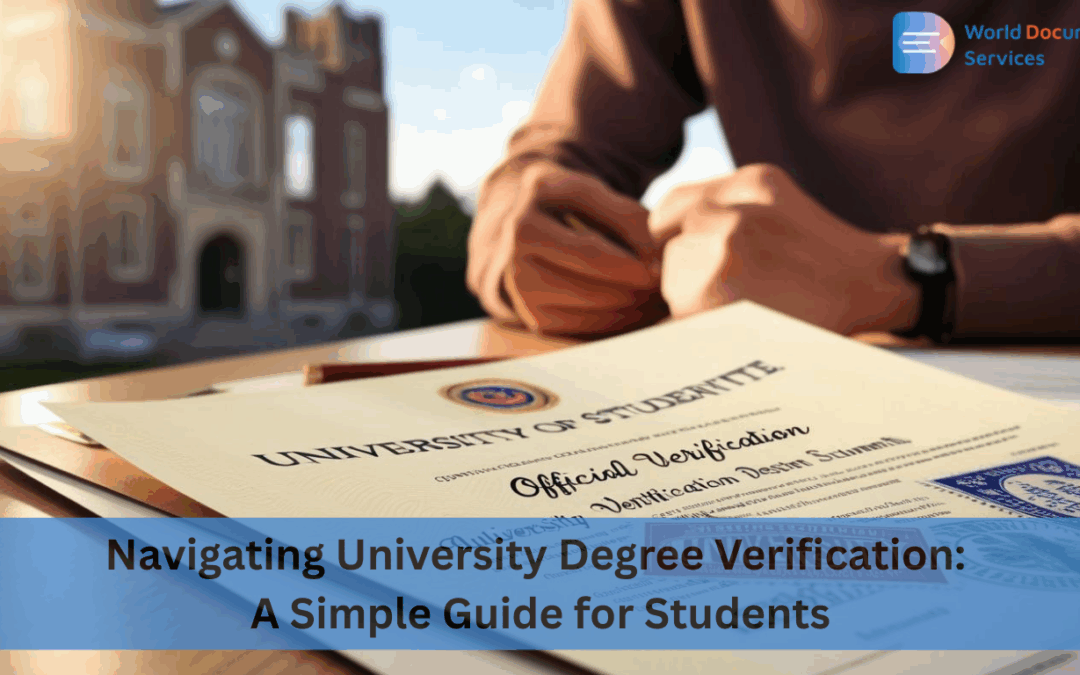
by Aayushi Thadwani | May 2, 2025 | Most Viewed
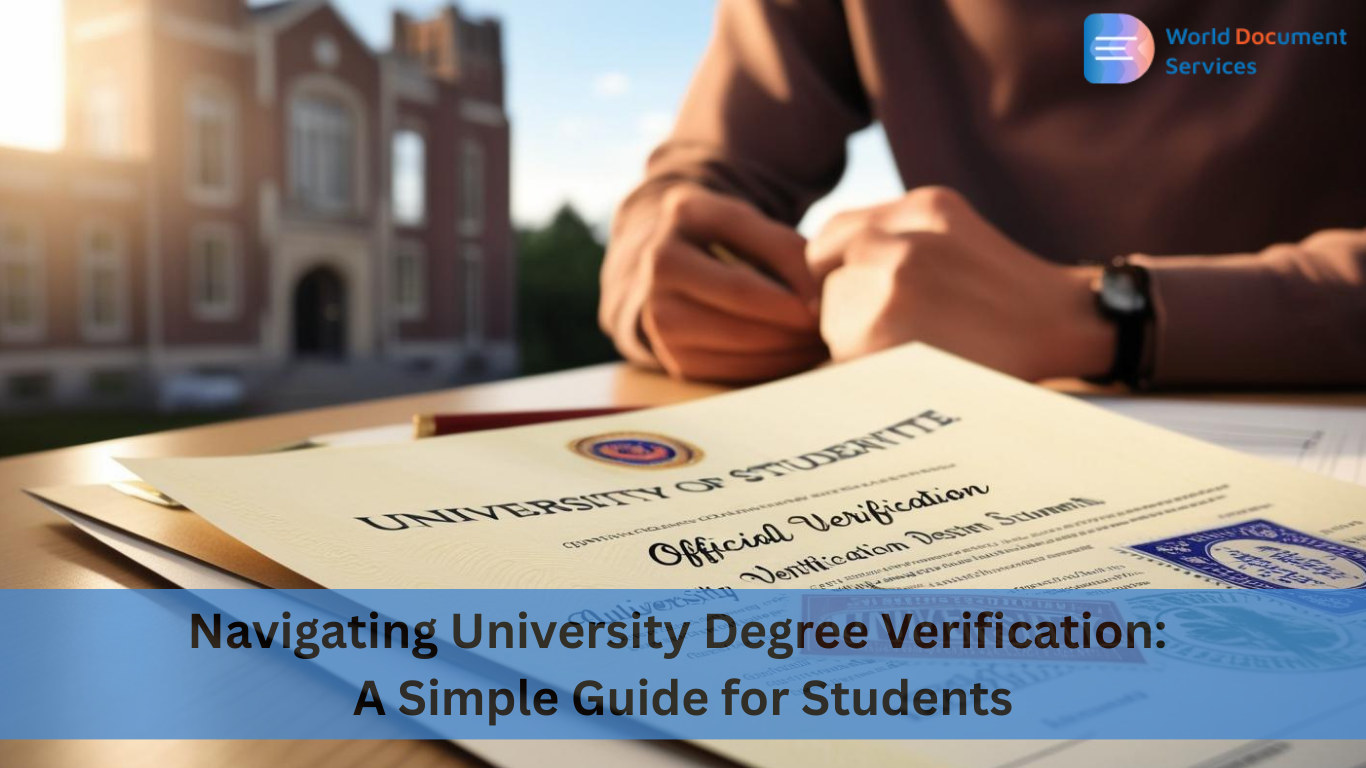
In the global academic and professional spheres today, credential verification is more than just a formality; it’s a necessity. It doesn’t matter whether you’re applying for postgraduate studies overseas, applying for a government job, or moving to another country to accept a job offer; university degree verification is a fundamental way of demonstrating your academic legitimacy.
This guide is meant to support you in understanding the degree verification process, explain the criticality of verification of academic credentials, and demonstrate ways to expedite the verification process using online degree verification solutions. When you finish reading this, you’ll know what you are looking for, how to complete it quickly and efficiently, and how to avoid many of the common mistakes that delay or stagnate thousands of students from degrees each year.
Need help with your University Degree Verification? Contact Us Now!
What is university degree verification?
University degree verification is a formal process in which the educational institution authenticates a student’s degree or academic record; the rate at which verification occurs can vary. Verification can include authentication of a degree certificate, mark sheets, and all supporting documents issued by a university. Most verification comes from employers, embassies, verification agencies, or other educational institutions.
Why is it important?
In the digital age and competitive market, there are many fake degrees and fake educational records. Institutions and employers want to ensure that the documents you present are legitimate and issued by a certified entity.
Understanding the Degree Verification Process
The degree verification process generally follows these core steps:
- Submission of Application: Students or third parties (like verification agencies) must submit a formal request to the university along with the necessary documents.
- Document Review: The university examines the submitted credentials to ensure they match their official records.
- Authentication and Endorsement: If verified, the university stamps or seals the document as “Verified” or provides a formal verification letter.
- Dispatch or Upload: In some cases, these documents are physically couriered to the requesting authority. Increasingly, however, this is done through degree certificate verification online portals.
This process can vary depending on the country, university, and the nature of the document.
Shift Towards Online Degree Verification
Many institutions and countries have shifted to online degree verification systems. These platforms allow students, alumni, and verification agencies to access secure databases that confirm educational records in real-time.
Some prominent platforms include
- National Academic Depository (NAD) in India
- DigiLocker Integration for University Certificates
- Student Clearinghouse in the United States
- WES (World Education Services) for international credential evaluation
- In-house university document verification portals are managed directly by institutions.
Benefits of degree certificate verification online include
- Faster turnaround time
- Digital and paperless transactions
- Reduced risk of lost or forged documents
- Secure access control
- Compliance with global verification standards
If your university is not yet online, you’ll need to rely on traditional manual processes.
What is Academic Credential Verification?
Academic credential verification is a broader term that includes verifying not just your degree certificate but also the following:
- Transcript/Marksheet Verification
- Course completion certificates
- Medium of Instruction (MOI) letters
- Provisional degrees
- Revaluation letters (if applicable)
- And any academic documentation tied to your credentials
This step is vital when you’re planning to study or work abroad, especially in countries like Canada, the U.S., Australia, and Germany, which require credential equivalency evaluations.
How to Initiate University Document Verification
Follow these best practices to ensure smooth university document verification:
- Know the Requirement: Understand whether the end institution requires original verified documents, soft copies, or attested versions.
- Prepare Your Documents: Keep your degree, marksheets, ID proofs, passport copies, and application forms handy.
- Use Official Channels: Always request verification through your university’s registrar’s office or official website. Avoid third-party agents unless they are officially authorized.
- Track Your Application: If online portals are available, use tracking features. If not, maintain communication via email or phone with university personnel.
- Pay the Fees Promptly: Some universities charge a nominal fee for processing verifications or couriering documents abroad. Ensure you make timely payments to avoid delays.
Common Pitfalls to Avoid
- Incomplete Applications: Even a single missing document can delay the process.
- Wrong Authority Contacted: Always verify the designated contact point at your university.
- Procrastination: Initiate the verification process at least 1-2 months before your deadline.
- Not Cross-Checking the Format Required by the End-User: Some embassies or companies require sealed envelopes; others demand digital signatures.
Conclusion:
In the digital age, university degree verification is more accessible yet more critical than ever. Whether you’re dealing with academic credential verification for international study or online degree verification for employment purposes, a well-prepared and strategic approach can save you time, money, and unnecessary stress.
Always stay informed about your university’s verification mechanisms. And most importantly, treat your academic documents with the same level of seriousness as your passport or visa. They are your educational identity in the global marketplace.
Download the World Document Services App
You may enjoy a hassle-free experience by downloading our mobile app from either the App Store or the Play Store. It works with both iOS and Android devices.
Frequently Asked Questions (FAQs)
Q: How long does the university degree verification process take?
A: Typically, 10 to 30 working days, depending on the university and mode (manual or online). Delays are common during peak academic seasons.
Q: Can I verify my degree online if I graduated several years ago?
A: Yes, many universities offer online degree verification, even for alumni. However, you may need to update your student profile or contact the registrar.
Q: Is notarization the same as academic credential verification?
A: No. Notarization only confirms your identity and the authenticity of the document copy, not the academic content or issuance by the university.
Q: Can I send verified documents directly to a third-party institution, or does the university need to send them?
A: It depends. For most embassy or credential evaluation agencies, the documents must be sent directly by the university in a sealed envelope or secure digital channel.
Q: What if my university doesn’t offer online verification?
A: In such cases, you’ll need to go through manual routes—submitting physical copies and using postal services or authorized agents recognized by the university.
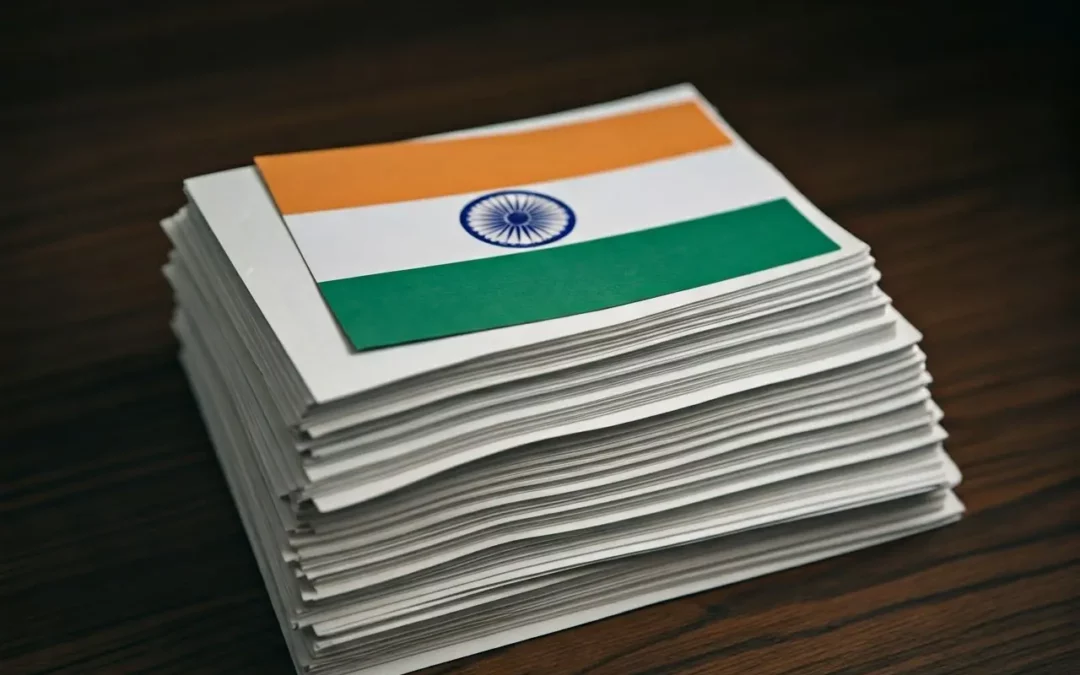
by Shipra Choudhary | Apr 7, 2025 | Most Viewed, Online Transcript Services

One of the most important steps that foreign students, professionals, and job seekers need to undergo is academic verification. Making sure that your academic credentials are checked properly is important for your future, whether you’re applying for college, a job, or a visa. This blog post will talk about 10 important steps that make it easy to check your academic credentials in places like India, Canada, and the USA. This guide will show you the steps you need to take to make sure that the process of verifying your academic transcripts and credentials goes smoothly.
Need help with your Academic Verification? Contact Us Now!
Why is Academic Verification So Important?
Verification of your academic details or you can simply say the process of academic verification is important because colleges, companies, and immigration departments make sure that your official academic records, like transcripts, degrees, and diplomas, are genuine. Your application for college, a job, or immigration could be rejected if you fail to present proper documentation. It’s important to ensure that you are who you say you are, it’s like the foundation of your education!
Okay, now that we know what’s going on, let’s get into the 10 steps that will help you get through the process of verifying your academic documents, whether you’re enrolling in in the US, Canada, or India.
Read more: The Essential Guide to University Certificate Verification for Overseas Education
1. Start Early: The Key to Smooth Verification
Students often make the mistake of waiting until the very last minute to start the process of academic verification. Start early if you want to apply for a job, a visa, or an academic institution to study abroad. Different institutions have their own different way of handling the documents and starting the process, so in order to avoid unnecessary stress, starting early is the best thing you can do for yourself . Try to start the process at least 6 to 8 weeks before the date for your application.
2. Understand the Different Types of Academic Verification
Academic verification isn’t just one-size-fits-all; there are various types of verification. Knowing which type you need will save you time and ensure you’re getting the right documents in order. Here’s a breakdown:
- Transcripts Verification: Here, authenticity of your official transcripts is verified by providing a detailed account of your courses and grades.
- Degree Verification: If you have a degree or a diploma that needs to be verified then you should go for this.
- Diploma/Certificate Verification: Here, certificate or diploma holders can be benefited as this verification ensures that these are genuine and issued by the institution.
3. Gather All Necessary Documents
The next step in the academic verification process is to collect all the necessary documents. Make sure you have the following:
- Original Transcripts from your educational institution.
- Degree Certificates proving your academic qualifications.
- Proof of Identity (passport, ID card, etc.), especially for international verifications.
Having these ready will save you time later. Some institutions or third-party services may even allow you to submit your documents online, making the process faster and more convenient.
4. Reach Out to Your Educational Institution
Once you have all of your documents together, you should reach out to the college where you’re studying or studied. Most of the universities and colleges have departments that only deal with requests to verify academic credentials. You can contact them via their website, email address, or even their helpline number.
You just need to make sure that you provide all the correct information– student ID, the name of the college where you were enrolled, and the year you graduated. By doing so, the entire process will be easy as they can find your information quickly, which speeds up the verification process.
5. Use a Trusted Third-Party Verification Service
If you want the process to go smoothly, you could choose to opt for a reputable third-party verification service like World Document Services (WDS) — they are experts at handling the process of verifying transcripts and can help you with the tricky parts of verifying academic credentials. Instead of going through all the hassle, it is better to choose a third party service.
Not just the process but it will also save time, lowering the risk of mistakes and delays as they know the whole process better than us– handling foreign credential verification for studying abroad or making sure all of your documents meet the requirements.
6. Understand International Verification Requirements
The process of academic verification can be different from one college to another and now here we are talking about the international academic verification process, how can we expect it to be a piece of cake? If you are applying for universities or jobs in countries like Canada or the USA, the requirements might differ from those in India. For example, in Canada, the World Education Services (WES) plays a key role in verifying your academic documents, while in the USA, organizations like the National Student Clearinghouse are typically used.
7. Know the Processing Time for Verification
Before you start the process of verifying your educational credentials, you should know how long it will take. These waiting periods can change depending on the location, the organization, and the type of verification. Verifications can take anywhere from a few weeks to a long time.
8. Check for Any Required Additional Documents
In some cases, the verification process may demand additional documentation. Universities or employers may ask for official stamps, sealed envelopes, or translations of your academic papers that have been verified for accuracy if they are not in English. Always ask if there is any extra paperwork that needs to be filled out. Ignoring this can cause delays which are not mandatory.
9. Ensure the Legitimacy of Your Documents
Remember that the main objective of academic credential verification is to be confident that your academic documents are authentic. So, make sure that whatever documents you send are genuine and haven’t been changed in any way. If you had to ask for a new copy or a reprint, make sure that these are official copies that were sent to you by the institution you attended.
10. Stay Updated and Follow Up
Maintain close tabs on the process once your academic documents are being verified. You can check back often to see what’s going on with your application because many organizations and verification services let you see where your application is at the moment. If problems happen, like missing documents or mistakes in your information, you should move quickly to avoid delays and keep things going smoothly.
Read more: Navigating the Document Verification Process for Canadian Universities
Conclusion: Streamline Your Path to Success!
The process of academic verification doesn’t need to be complex. If you do these 10 essential tasks, you can be sure that your academic credentials have been evaluated thoroughly and that you are ready for your next big shot. Assessing your academic records is an important step in the process whether you’re applying to college, looking for a job abroad, or getting ready to immigrate.
The process can be a lot easier to handle if you start early, know exactly what you need, and use reputable services like World Document Services (WDS). If you do things the right way, your academic verification will go smoothly, on time, and without any extra stress.
Visit World Document Services (WDS) today to get expert help with verifying your academic credentials and making the process of verifying your transcripts easier. This is the first step toward your global possibilities!
Download the World Document Services App
You may enjoy a hassle-free experience by downloading our mobile app from either the App Store or the Play Store. It works with both iOS and Android devices.
FAQs
Q: What is the Difference Between Degree Verification and Transcript Verification?
A: Degree verification —attempts to see if the credentials or degree you say you have is legitimate and comes from a recognized educational institution. While transcript verification —examines the academic records, such as courses, grades, and credit hours, to make sure they match what was given about the student’s academic background.
Q: Do I Need Academic Verification for Jobs Abroad?
A: Yes, verification of your educational accomplishments is often needed when applying for work abroad. In the USA, Canada, and the UK, for example, employers will often ask to see proof of your college credentials to make sure that the skills you list on your cover letter are real.
Q: Can I Verify My Academic Credentials Online?
A: Yes, you may undertake the process of verifying your academic documents online with numerous educational institutions and third-party services. Some services, like World Document Services (WDS), let you upload your educational documents digitally so they can be checked— making the process faster and easier.
Q: What Happens if My Academic Documents Are Found to Be Fraudulent?
A: You can land up in jail in the worst scenario but one thing is for sure— your educational or professional career is finished. Educational institutions or companies may turn down your application, and you may not be able to apply for jobs or educational institutions in the future.
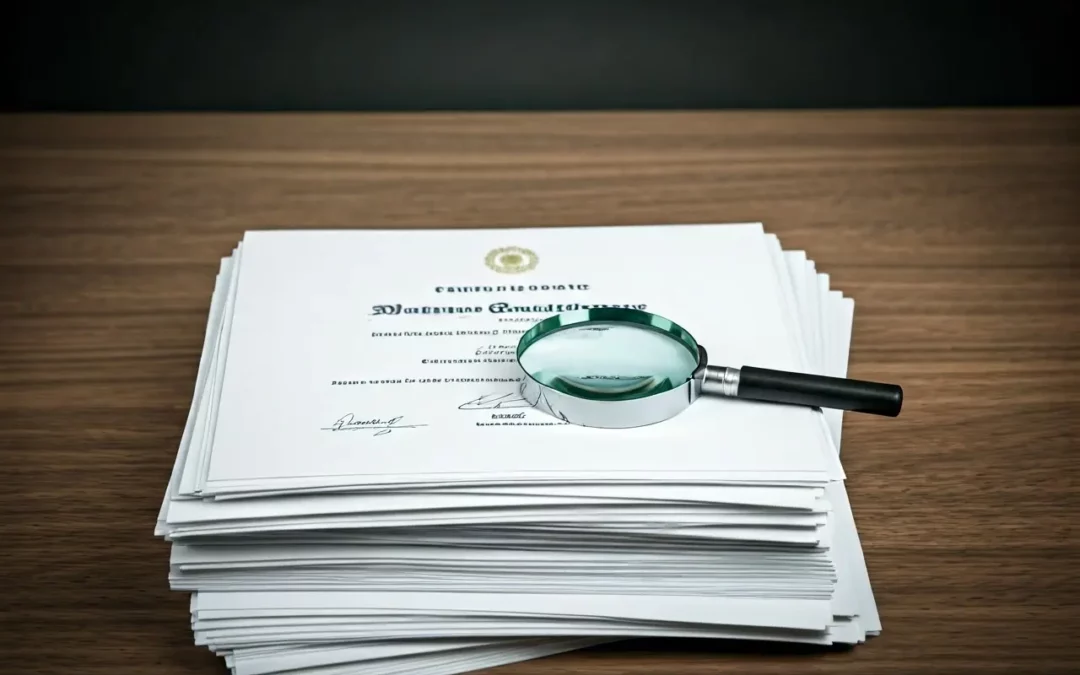
by Kanika Jiwnani | Feb 19, 2025 | Document Verification, Most Viewed

Degree verification in India can often feel like navigating a complex maze. From universities to employers, the process involves multiple stakeholders and can be fraught with difficulties. In this blog, we’ll explore the common challenges faced during degree verification in India and how one can overcome them.
Need help with the Degree Verification process in India? Contact Us Now!
Common Challenges in Degree Verification in India
Degree verification is an important process in matters of migration, whether for employment or educational purposes. This is a lengthy process that involves multiple steps, starting from contacting the university to getting the entire process sorted, concluding it by getting your degree verified. However, this process is lengthy, has its own challenges, and creates many issues, such as inaccuracies, errors, and delays, which often cause trouble for the applicant.
Read more: What Documents Do I Need for University Degree Verification?
1. Lack of a Centralized Degree Verification System
One of the biggest challenges in India is the absence of a centralized record system for academic credentials. With thousands of universities deemed universities and colleges maintaining separate records, accessing verification data becomes cumbersome. Unlike some developed nations with unified academic databases, India’s fragmented system causes delays and inefficiencies. Establishing a centralized database would streamline the verification process, making it more efficient and accessible.
2. Manual and Paper-Based Processes
Many universities in India are still functioning on traditional paper-based record-keeping of documents or maintaining the records, which is now pretty outdated as well as less reliable. Keeping an outdated working pattern slows down the entire verification process, making it less reliable and error-free. Having a paper-based record increases the chances of misplacement and errors in the records.
3. Inconsistent Verification Procedures
The degree verification process varies entirely from university to university. Some institutes have a traditional way of bookkeeping; some have a modern one. Some universities do not have a predefined process of degree; some have methods that one can follow and obtain. This inconsistency leads to delay, and only proper planning can help you avoid this delay.
4. Delays in Response from Universities
A common issue in academic credential verification is the prolonged response time from universities. Due to multiple drawbacks and inefficiencies, understaffed departments, and administrative bottlenecks, it can take weeks or even months to process verification requests. These delays can negatively impact job opportunities, admission timelines, and visa applications.
5. Forgery and Fraudulent Degrees
Fake degree certificates and fraudulent academic claims are widespread in India. Many individuals attempt to avoid verification by presenting fraudulent documents. This has made it essential for organizations to implement a strict degree verification process. Figuring out the genuine credentials from fraudulent ones still remains a challenge, especially when universities lack a transparent and uniform verification system.
6. Limited Digital Infrastructure
Some universities, with time, have developed and have started to maintain the digital verification method, while others are still enticed by the traditional paperback method of verification. In the absence of digital methods and uniform methods, many individuals are forced to rely upon postal communication, which is also inefficient and makes the entire process a hassle.
7. High Verification Costs
The cost of verification again is similarly a barrier for individuals and organizations, as these universities have varied and scattered fee systems. Some institutes charge the fees of verification along with the application of transcripts, while others consider it an individual cost. The verified degree to be sent to a domestic address or to be sent to an international employer is also a point where the cost will differ.
8. Complexity in Verifying Foreign Degrees
For Indian students who have studied abroad, verifying foreign degrees can be even more complicated. Validation from international institutes is given to students who follow the Indian educational system. Lacking a uniform system makes the entire process lengthy and creates a long waiting list and waiting periods.
9. Limited Awareness and Guidance
Many students and professionals planning to move abroad and pursue their careers ahead of time are unaware of the fact that there’s a step such as degree verification. A lack of such information makes it difficult for one to also understand the correct degree verification process and struggle to find the right one as well. Unclear guidelines from the university make it difficult for one to obtain the documents verified on time, and the process is complicated.
10. Data Privacy and Security Concerns
With increasing digitization, data security is a major concern in academic credential verification. Universities and verification agencies must ensure that personal and educational data are protected from cyber threats and unauthorized access. The risk of data breaches or misuse of sensitive academic records discourages institutions from fully adopting digital verification methods.
Solutions to Improve the Degree Verification Process in India
While challenges persist, several measures can enhance and streamline the degree verification process:
- Centralized Database: A common database for academic records would simplify verification and reduce inconsistencies.
- Digital verification methods: Universities must start to use blockchain-based verification systems to enhance efficiency and reduce fraud.
- Verification Procedures: Establishing a uniform verification process across all universities will create transparency and accessibility.
- Automation and AI Integration: Leveraging AI-driven verification tools can help detect fake degrees and speed up the record retrieval process.
- Awareness Campaigns: Educating students and employers on the correct verification procedures can reduce errors and miscommunication.
How World Document Services Can Help
For individuals and organizations looking for a streamlined verification process, professional degree verification services can be highly beneficial. We at World Document Services help you obtain and verify academic credentials efficiently, minimize delays, and ensure authenticity and reliability. With expertise in handling verification requests, we help navigate complex procedures and provide reliable solutions for academic record verification.
Read more: 10 Reasons Why University Degree Verification is Essential for Employers
Conclusion
Degree verification in India is a complex process with multiple challenges, including inconsistent procedures, delays, high costs, and fraudulent degrees. While steps are being taken to improve the system, more effort is required to standardize and digitalize the verification process. By adopting centralized, secure, and efficient verification methods, India can enhance the credibility of its education system and facilitate smoother verification for individuals and organizations alike.
Download the World Document Services App.
You may enjoy a hassle-free experience by downloading our mobile app from either the App Store or the Play Store. It works with both iOS and Android devices.
FAQ:
Q: Why is degree verification important?
A: It helps the employees and educational institutions to ensure that the documents submitted by the individual are authentic and are shared by the university themselves.
Q: How long does the degree verification process take in India?
A: It varies depending on the university. If the documents submitted are correct, it can take weeks or other than months to years if there are any errors.
Q: How can I verify my degree from an Indian university?
A: Both online and offline models are available. But if you are present in the same city as your university, it is suggested that you visit and attempt to get verified.
Q: What are the costs associated with degree verification?
A: Cost entirely depends on the number of copies applied. Mode of application, i.e., online or offline, method expedited or normal. The cost may vary as per your requirements.
Q: Can fake degrees be detected?
A: Yes, rigorous verification processes can help identify fraudulent degrees.

by Kanika Jiwnani | Jan 20, 2025 | Document Verification, Most Viewed

In the academic and professional worlds, verifying educational qualifications is becoming more critical today. It could be for higher education, scholarship schemes, or an employment opportunity where the authenticity of academic records would be crucial. Here, it is important that academic verification plays a pivotal role. Academic verification is a procedure that verifies an individual’s legitimate educational qualifications, including degrees, diplomas, or transcripts.
Need help with your Academic Verification Process? Contact Us Now!
World Document Services is the world’s largest and most prominent academic document verification service. They streamline the process to ensure your academic credentials are accurate, authentic, and recognized by educational institutions and employers across the globe.
What is academic verification?
Academic verification is a process in which the academic credentials of an individual are verified with the issuing academic institution. It is ensured that the academic documents—such as transcripts, diplomas, and certificates—are authentic and correctly represent the academic achievements of the individual.
This step usually includes:
- Authentication of Degree: Verifying that the degree or certificate was indeed awarded legitimately.
- Verification of Course Completion: Ascertaining that the courses mentioned were completed.
- Cross-verification of marks or grades: Ensuring that the grades or marks provided are accurate.
Sometimes, this verification is necessary between employers, universities, or immigration authorities to avoid false claims and ensure applicants meet certain qualification requirements.
Read more: The Essential Guide to University Certificate Verification for Overseas Education
Why is Academic Verification So Important?
Ensuring that academic credentials are genuine is vital for employers, educational institutions, and students alike. It helps maintain integrity, prevents fraud, and ensures that all parties can trust the qualifications being presented. Without such verification, organizations risk employing unqualified individuals, potentially leading to severe consequences.
1. Helps in avoiding fraud related to academic qualifications
As there is an increased level of fraudulent academic documents, learning institutions and employers are cautious. Verification of academic credentials ensures that the applicants present original and legitimate qualifications. This protects the organizations from employing or admitting individuals with forged qualifications.
2. Trust and credibility are built
Verified academic credentials build trust between the applicant and the organization. Be it applying for a job, admission to a university program, or a visa, presenting verified academic credentials is proof of one’s credibility and professionalism.
3. Facilitates Admission to Universities
Most universities are very strict in admitting students by first confirming academic credibility, and thus, verification of academic records is recommended. Verifying academic records helps an institution determine if the applicant meets the set academic requirements for a certain program.
4. Visa, Immigration, etc., for a Move Abroad
For students or professionals seeking a move abroad, it often requires verified academic records for immigration, visa processing, or international admissions. Academic document verification ensures your qualifications are valid and recognized globally.
5. Employment
Specialized industries like healthcare, engineering, and law require proof of educational qualifications. Verified academic records ensure that candidates have the right credentials for their jobs.
6. Professional Licensing and Certifications
Many professional bodies only issue licenses or certifications after verifying your academic documents. World Document Services verifies your credentials, thus opening the doors to professional qualifications.
7. Scholarship and Financial Aid Applications
It facilitates scholarship and financial aid applications. Academic excellence is verified before disbursing financial aid. Verified academic documents are proof of such academic achievements that increase the chances of getting funded.
How World Document Services Simplifies Academic Verification
World Document Services is a well-trusted company that deals with all academic verifications. It facilitates the verification of educational qualifications for individuals and organizations in a proper and efficient way. Its services include the following:
- International Academic Verification
World Document Services collaborates with universities and educational institutions worldwide to verify academic records that are used locally and internationally.
- Safe Handling of Documents
Security is paramount. World Document Services employs secure, encrypted systems to handle sensitive academic documents and ensure confidentiality and data protection in the verification process.
Their professional team checks and verifies your documents thoroughly, reducing errors and ensuring that your records are accurate and complete.
- Direct Delivery to Institutions
Most institutions require institutions to have these transcripts and certificates sent directly. World Document Services delivers your documents straight and safely to the intended educational institutions.
World Document Services follows up on the verification of documents in real-time. You find out at each stage with the confidence you’ll get from their process.
World Document Services is keeping up with expediting the timely processing of certified documents well ahead of submission deadlines.
Accessible Academic Verification: On-the-go Convenience
It becomes even much easier with easy access to world document services—through a conveniently downloadable mobile application on iOS as well as an Android device through which you would be able to upload your academic record for verification through our services quickly, track what is happening every step of the way, and get instant notifications and updates.
Have access to any questions or issues.
You can download the mobile application from the App Store or the Google Play Store and have a smooth experience. It is available for Android as well as iOS devices.
Read more: Why Academic Verification Matters for Your Career
FAQs
Q: Academic verification: what does it mean?
A: It is the procedure of verifying the authenticity of educational qualifications, like degrees, transcripts, and certificates, with the issuing institution.
Q: Why is academic verification important for university applications?
A: It ensures that your qualifications are authentic and meet the eligibility criteria for university admissions, reducing the risk of fraudulent claims.
Q: How does World Document Services verify academic records?
A: World Document Services contacts the issuing institutions directly to verify the authenticity of your academic credentials and guarantees that documents are processed and submitted securely.
Q: Can I track my verification status?
A: Yes. You can always check on your document verification in real time with World Document Services by using their mobile app.
Q: Is my verification secure?
A: Absolutely. Through encrypted systems, World Document Services ensures the safeguarding of sensitive academic information about you at each point during verification.
Q: How long will it take for my academics to be verified?
A: Well, there’s a time-to-process variable here, but at World Document Services, efficiency and prompt verification will be undertaken to ensure one meets critical deadlines in time.
Q: Is World Document Services able to aid in international applications?
A: Yes. They can validate academic documents from both the higher education sectors locally and the requirements of a given university or immigration abroad.
Conclusion
Academic verification refers to the authenticity test of qualifications undertaken in higher learning, employment, or international application processes. This authenticates that credentials frauds may not creep through to any particular institution and/or employer as there is a due requirement.
World Document Services makes it easy with safe, accurate, and efficient academic document verification solutions that range from global verification to secure document handling and real-time tracking.
Download the World Document Services mobile app today on the Google Play Store or Apple Store and take control of your academic verification process for a faster and hassle-free experience.
Let World Document Services ease your academic journey and make it much more secure!
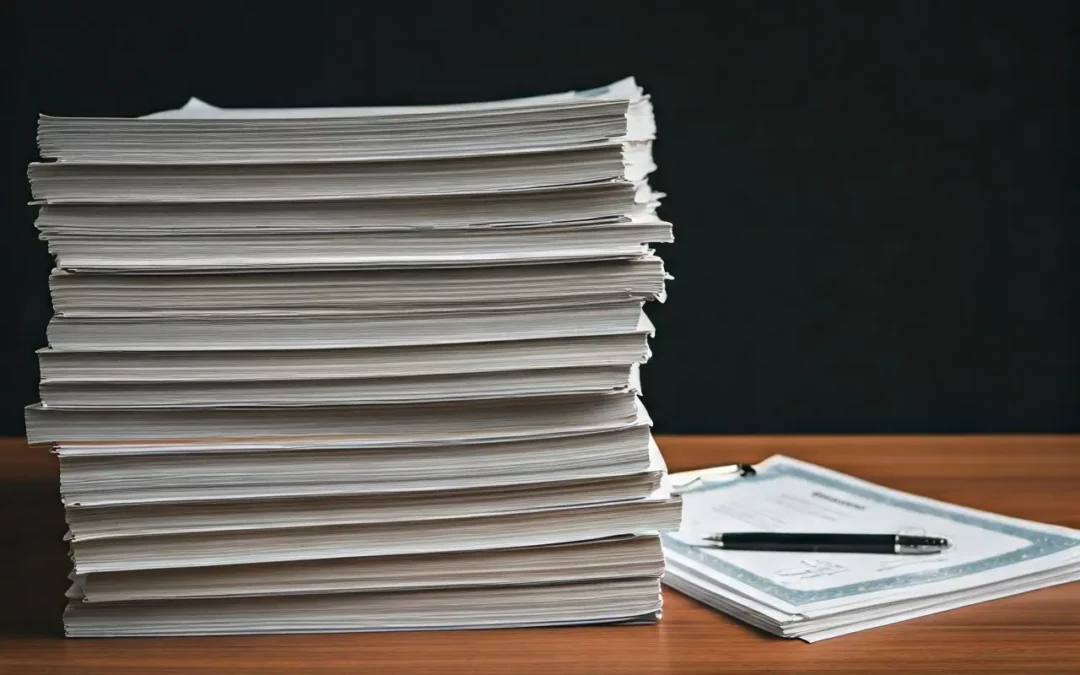
by Kanika Jiwnani | Dec 31, 2024 | Most Viewed

Navigating university degree verification can be daunting, but knowing exactly what documents you need can make the process much smoother. This guide will help you gather everything necessary for a hassle-free experience.
Need help with the University Degree Verification process? Contact Us Now!
Introduction to University Degree Verification
Understanding the purpose and the reasons behind university degree verification can help set the stage for why you need specific documents.
University degree verification is a crucial step, often required by employers, educational institutions, or immigration authorities. It ensures that your claimed credentials are authentic and accurate.
The process might seem intimidating at first, but with the right preparation, you can handle it smoothly. Let’s dive into the essential documents you’ll need.
Read more: 10 Reasons Why University Degree Verification is Essential for Employers
Documents You Need for University Degree Verification
Verifying your university degree is an important step to take if you want to seek a job, further your education, or relocate to another country for any reason. Validating the validity of documents is an essential stage in appraising organizations. In this post, we will explain and walk you through the education verification process.
Why is university degree verification important?
Moving ahead, it is important for us to keep in mind why the degree verification process is necessary. While submitting your documents, ensure that the documents you provide to the employer or the university are authentic verification of documents. Ensure that the degree and other documents that they have claimed are true and authentic.
Organizations like employers, universities, and licensing bodies require degree verification to ensure that you meet their educational standards. For example, many employers verify educational backgrounds to confirm that candidates possess the qualifications they claim.
What Documents Are Required for University Degree Verification?
The documentation required might differ from one institution to another or even from country to country. However, the following are the most common papers required for degree verification.
- Degree Certificate: The most important document you are going to require is your degree certificate, which happens to be the official proof that you have successfully completed the course and are a graduate of the same university.
- Academic Transcripts: Transcripts are detailed records of your academic journey. It has a detailed description of the course you have covered and the marks you achieved in the specific year, along with all the details relevant to academic information. Transcripts are one of the key documents required for educational credential verification, as they provide insight into your academic history.
- Marksheets: You will have to submit your marksheet for each of your semesters. These documents show your academic skills and individual scores in each subject.
- Proof of Enrollment or Graduation: Some institutions or employers request a document confirming your enrollment or graduation from the university. If your degree certificate does not provide the needed clarity, you may need to provide an official letter from your university.
- Identification Documents: Institutions conducting the verification may require a copy of your passport, national ID, or other government-issued identification to confirm your identity.
- Language Translations (if applicable): If your degree certificates, transcripts, or mark sheets are not in the language of the institution requesting the verification, you may need to provide certified translations. These translations should be done by a qualified professional to ensure accuracy.
How Does the Degree Verification Process Work?
The degree verification process typically involves a series of steps that are to be followed one by one in a specific sequence. Here’s how it usually works out:
Document Collection
You have to start with collecting all the documents needed, such as your degree, your academic results, and your transcripts, along with any government-approved identification or proof of graduation. Some institutions might need the original copies while others work this out with copies of it.
Submission to Verification Service
Once you’ve gathered all the necessary documents, you’ll submit them to a verification service or directly to the requesting institution. This service will usually verify your credentials with your university or educational institution.
Verification by the University or Institution
The verification service will contact your university or the institution where you earned your degree. They will verify that your qualifications are genuine and that your academic records align with the information provided.
Verification Outcome
After all verification processes, you will be sent a report stating whether your degree has been successfully verified or not. Errors in the verification process will request additional documentation or clarification of the information provided, together with the ID issued by your government, to verify your identity.
What If Your Degree Information Is Incomplete or Incorrect?
It might happen at times that there could be some errors in your degree verification process. Whether it’s spelled incorrectly or the course title can be incorrect. These minor mistakes can delay the process entirely. It’s important to keep your documents ready with the utmost accuracy while planning to verify your degree certificate.
What should you do if your degree information is incorrect?
If you find any problem or any error in your preexisting documents, you can contact the university directly, or you can contact service providers like World Document Services to get your documents corrected. In some cases, universities might require a formal request to be made, but such things are usually made easy by a service provider. This process might take time, so it’s advisable to address any discrepancies as soon as possible.
Can World Document Services Help?
This is often a long and sometimes confusing process, especially when navigating through different institutions or overcoming language barriers, and with the help of a third-party provider, you can ease these hassles. At World Document Services, we know how complex this process can be. We can help you get, authenticate, or translate your documents from the very beginning, even if you get stuck in the verification process. We want to make the verification process simple and ensure that your educational credentials are verified smoothly so that you can focus on the next steps in your academic or professional career.
Read more: 7 Benefits of Using Professional Transcript Services
Conclusion
A university degree is important for anyone wanting to pursue further opportunities abroad. Understanding what documents are required and how the verification process works will prepare you for what is to come. While sometimes lengthy or complicated, remember that organizations such as World Document Services can assist you in this process with ease and support every step of the way.
This will enable you to move forward in your career with confidence since your credentials will be genuine.
Download the World Document Services App
You may enjoy a hassle-free experience by downloading our mobile app from either the App Store or the Play Store. It works with both iOS and Android devices.
Frequently Asked Questions (FAQ)
Q: What documents are required for university degree verification?
A: You will need your degree certificate, academic transcripts, mark sheets, proof of enrollment or graduation, identification documents, and possibly translations or authentication/apostille, depending on the country and institution.
Q: How long does the degree verification process take?
A: It can take anywhere from a few days to several weeks, depending on the institution and the country. Expedited services may be available to speed up the process.
Q: Can my degree be rejected during the verification process?
A: Yes, if discrepancies or inaccuracies are found, your degree verification can be delayed or rejected. It’s crucial to ensure that all information is accurate and complete.
Q: How can I resolve errors in my degree records?
A: If you find any errors in your degree information, contact your university or issuing institution to request corrections. They may require formal documentation to amend the records.
Q: What if my documents are not in the required language?
A: If your documents are in a foreign language, you will need to provide certified translations from a qualified translator to ensure they are accepted during the verification process.











 Call Us
Call Us Mail Us
Mail Us WhatsApp
WhatsApp
